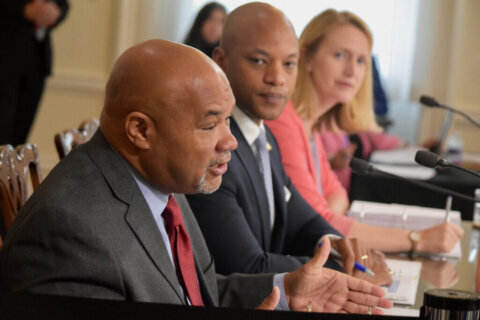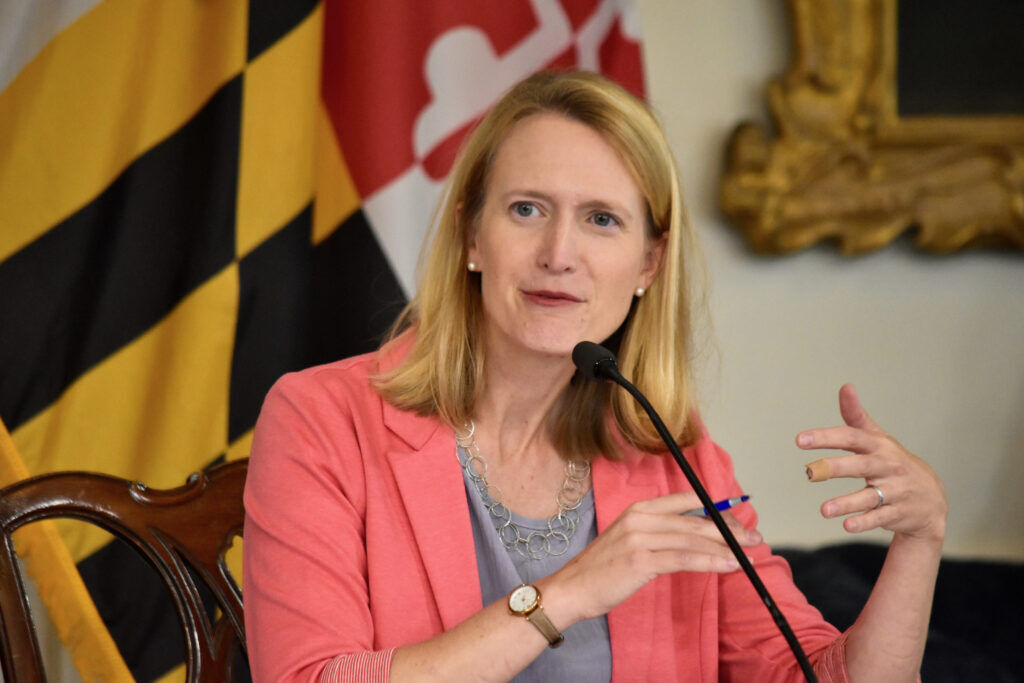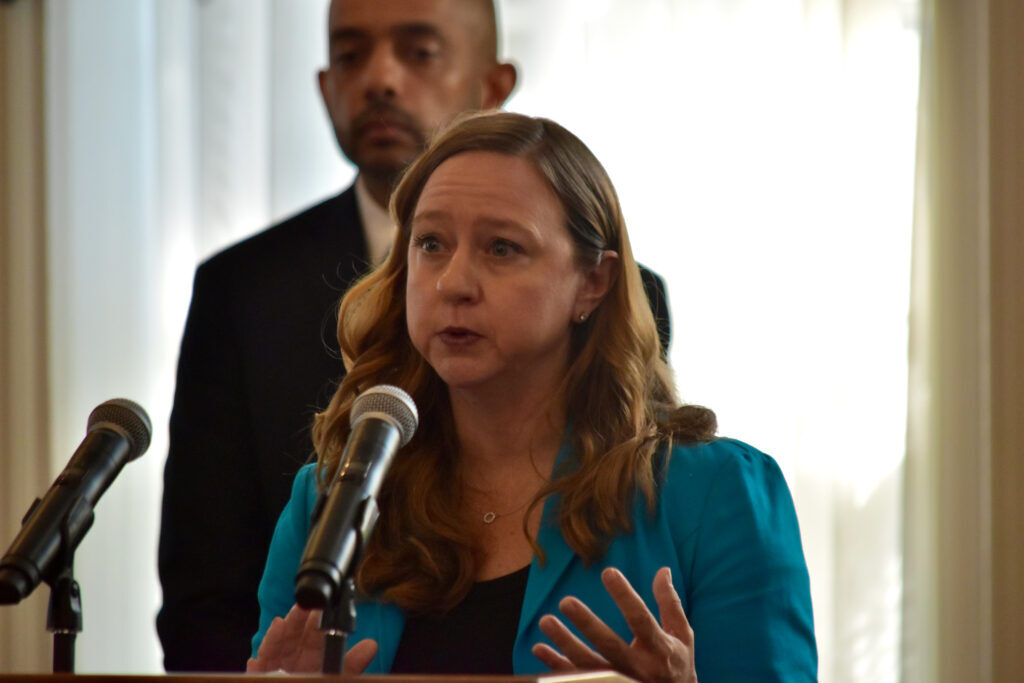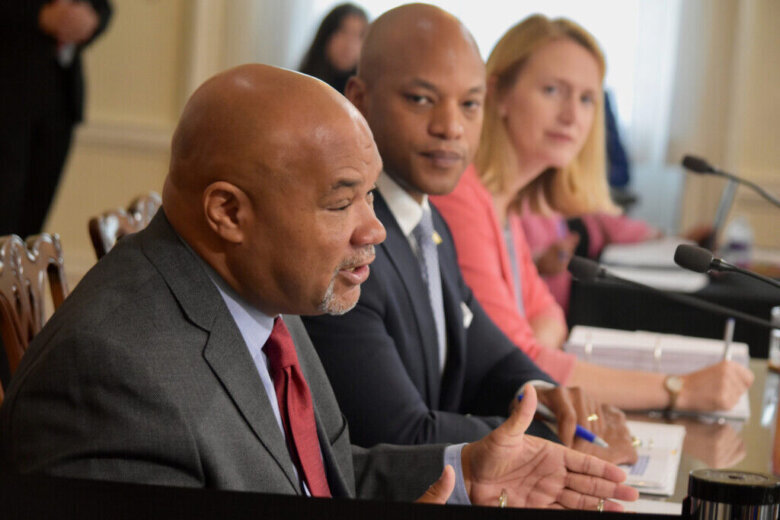Board of Public Works approves American Legion Bridge, vehicle emissions contracts – WTOP News

[ad_1]
Wednesday’s vote approved $150 million in contracts that could one day lead to a widening of the American Legion Bridge that carries the Capital Beltway over the Potomac River.

This content was republished with permission from WTOP’s news partners at Maryland Matters. Sign up for Maryland Matters’ free email subscription today.
The Board of Public Works voted Wednesday to approve $150 million in contracts that could one day lead to a widening of the American Legion Bridge that carries the Capital Beltway over the Potomac River.
The three-member panel unanimously approved two contracts valued at $75 million each with ATCS P.L.C. / Jacobs Engineering Group, Inc. and RS&H, Inc. / Gannett Fleming, Inc. / Johnson, Mirmiran & Thompson, Inc.
The board also approved corrections to a contract approved in July with Whitman, Requardt and Associates LLP / Rummel, Klepper & Kahl, LLP / WSP USA Inc.
All three open-ended contracts would cover planning, engineering, construction management, and other services related to the proposed lane widening of the I-495 and I-270 corridors including the American Legion Bridge as well as other unspecified projects across the state.
The three contracts total $225 million.
Comptroller Brooke Lierman (D) said she supports seeking federal grants for the project if there is also an opportunity to add a transit component.

“While this is also just the first phase of the restart of the American Legion Bridge work, I do also continue to have concerns about the efficacy of highway expansion as a means to alleviate traffic,” said Lierman. “It’s effective for making more cars on the road resulting in more greenhouse gas emissions and most relevant to my office and this board is any potential future reliance on a transportation P3.”
Lierman joined Gov. Wes Moore (D) and Treasurer Dereck Davis (D) in approving the contracts.
The vote comes on the same day the board altered a contract for the state’s Vehicle Emissions Inspection program that will reduce the number of new cars required to be inspected. The result will be a reduction in funding flowing to the state’s already overburdened Transportation Trust Fund.
Two weeks ago, the state transportation officials said they would seek more than $3 billion in federal funding to ease congestion on the American Legion Bridge and Capital Beltway corridor.
“Despite all the promises about equity, public engagement, and public transit, the Moore Administration is continuing to fund and move ahead with what is essentially Larry Hogan’s immensely harmful toll lane plan,” said Janet Gallant of DontWiden270.org. “If this project is ever built, the vast majority of the public will be worse off than they are now.”
The application filed by the Maryland Department of Transportation seeks an initial $2.4 billion federal grant from the U.S. Department of Transportation. The application, however, does not preclude a public-private partnership model favored by former Gov. Larry Hogan (R).
Australia-based Transurban announced in March that they would exit the project as proposed by Hogan.
Maryland will also seek $800 million from “a different pot” of federal money and contribute about $800 million in state funds.
The federal grants also do not rule out privately managed toll lanes as part of a congestion relief solution.
“There’s a lot of questions about this plan and I think there are people watching who will also have questions about what is coming forward,” said Lierman.
Despite the cancellation of Hogan’s public-private partnership, aspects of the previous proposal remain in litigation.
State transportation officials will continue to rely on a federal record of decision from the previous proposal. A coalition of groups continue to challenge those environmental studies in federal court.
“Comptroller Lierman was right to raise questions about the efficacy of expanding highways and the harm of greenhouse gas emissions,” said Barbara Coufal, co-chair of Citizens Against Beltway Expansion. “While Governor Moore and MDOT have emphasized their plans for transit, the money involved shows it is not a priority. The cost of phase 1 of the project is $4.032 billion. Only $119 million, or less than 3%, would be dedicated to transit.”
Board OK’s vehicle emissions inspection change
After a quick debate, the Board of Public Works also unanimously approved a contract that will alter the state’s 40-year-old Vehicle Emissions Inspection Program.
Once all the procedural hurdles are cleared, owners of new vehicles will not have to take them for emissions tests until they are 6 years old; current state regulations require emissions inspections on cars that are 3 years old.
Officially, the BPW vote alters a contract with Envirotest, a Halethorpe company that runs the emissions inspections for the state Motor Vehicle Administration (MVA), through the fall of 2024, providing the company with an additional $1.5 million. The vote also activates a regulation that the Hogan administration sought to alter the auto testing timetable.
At Wednesday’s meeting, Lierman noted that she voted against the proposed regulation last year as a member of the General Assembly’s Joint Committee on Administrative, Executive and Legislative Review — though the legislature was powerless to stop it.
Lierman said she had no problem altering the terms of the contract with Envirotest, because “the current contract is incredibly outdated.”
But she lamented the lost transportation revenue to the state by reducing the number of required vehicle emissions inspection tests — currently estimated at about $3.1 million. And she fretted that requiring fewer new car owners to get emissions inspections “places an undue burden” on poorer communities, where vehicles tend to be older and motorists will still be required to get their cars that have been on the road for more than six years tested every other year.
MVA Administrator Christine Nizer said a recent agency study on the environmental justice ramifications of the new regulation found that the cost savings and convenience of requiring fewer emissions tests would be applied equally across all communities and racial and ethnic groups in the state.

Davis said he was comfortable voting for the proposed contract change given the fact that 99% of 6-year-old vehicles pass their emissions tests.
“It’s unfortunate that it’s been made into a wealth vs. poor argument,” he said. “I don’t think it’s anything like that.”
Officials noted that the issue of lost revenues for transportation programs is being discussed by a newly convened commission. Lierman said that unlike Maryland, other states have managed to reduce the number of required vehicle emissions inspection tests “in a revenue-neutral way.”
Nizer said figuring out how to achieve that in Maryland will be part of the new commission’s mandate.
The Maryland Department of the Environment is holding a virtual public hearing on Sept. 18 on how it will implement the new rule. The agency must then submit the plan to the U.S. Environmental Protection Agency for approval.
[ad_2]
